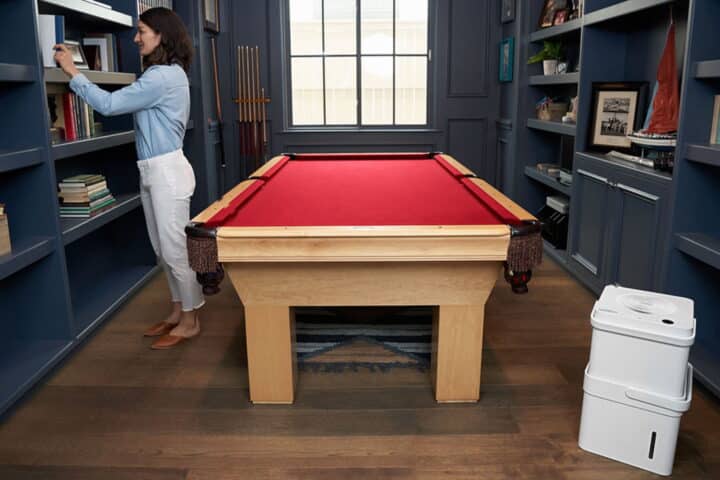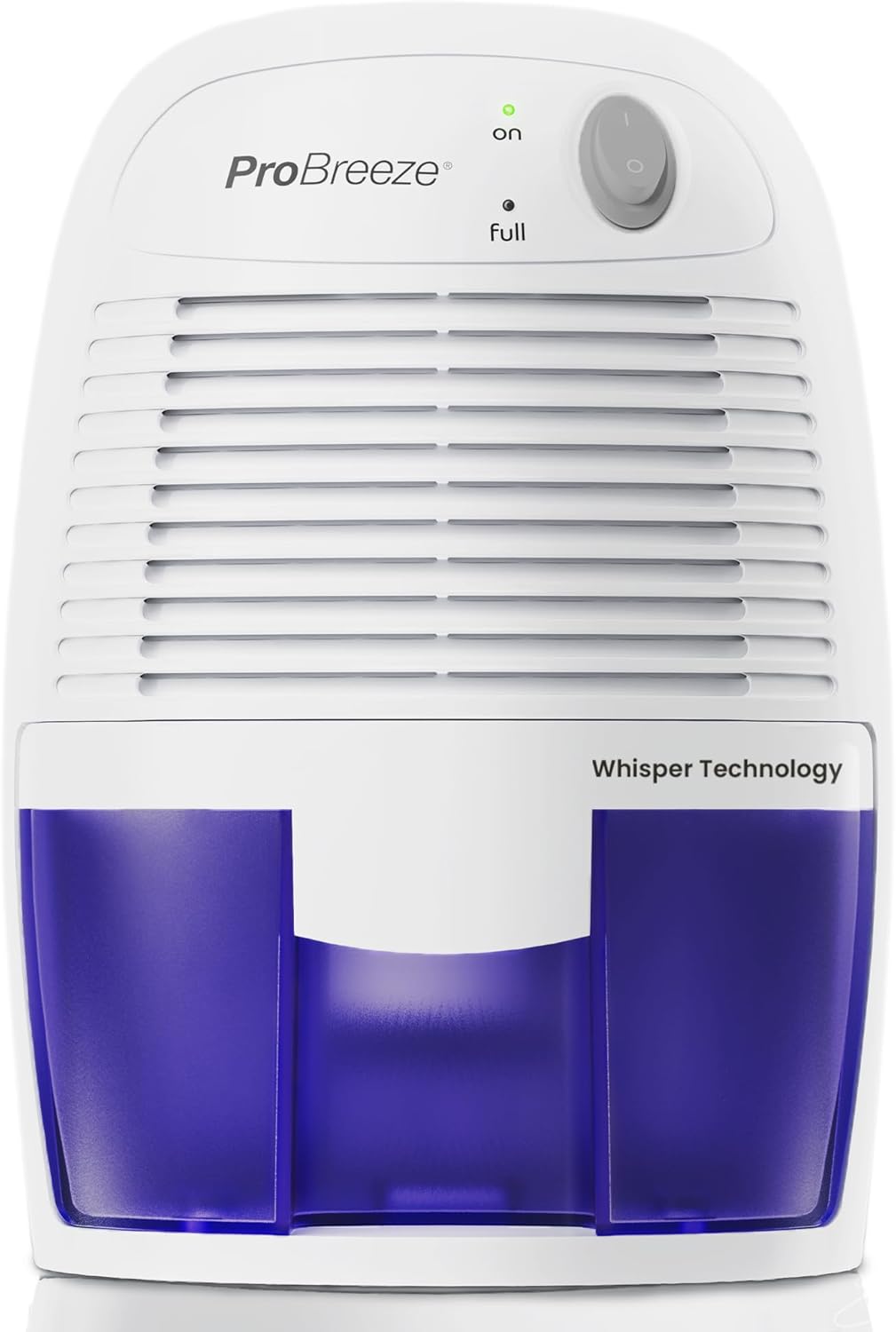Besides being uncomfortable, high humidity causes damage to your home and belongings. Keeping moisture within recommended levels is important to improve air quality, and the best dehumidifiers can maintain a comfortable living space year-round.
Smart devices are an option for those who wish to control their indoor environment through an app or voice commands. These units assess humidity in the home and adjust settings as needed. Wi-Fi “smart” dehumidifiers function automatically, alerting users to any necessary filter changes or full reservoirs, and some feature continuous drainage to a nearby basement drain or floor drain so you never have to worry about emptying the internal bucket.
Modern dehumidifiers are rated based on how many pints of moisture they can remove from the air. Some feature an Energy Star certification awarded to electronics that use electricity efficiently. While the most common use for these humidifiers is to dry out a damp basement, they’re also helpful in other rooms in the house. With dry air circulating through the home, the potential for mold significantly decreases.
The Best Dehumidifiers for the Home
Here are our current picks for the best dehumidifiers for the home. Some of our recommendations are smart-home compatible, giving you even more control over the humidity levels in your home, even when you’re not there. Smart dehumidifiers include an app that allows you to control fan speed, remind you to clean the filter or empty the water tank, and set schedules for when you want the dehumidifier to run.
Which size dehumidifier you should buy depends on room size. A 30-pint or smaller dehumidifier is typically suitable for small spaces like a bedroom or family room. A larger dehumidifier is necessary for larger rooms, like a basement or rec room.
All the tested dehumidifiers on our list are excellent choices, although each has unique features that make them top contenders.
Our Top Picks
Best Dehumidifiers
Honeywell 1500 Sq. Ft. Energy Star Dehumidifier
We personally own this dehumidifier, and it works well.
Coming in 30-pint, 50-pint, and 70-pint options, the Honeywell Smart Dehumidifier is our top pick for small and large rooms up to 4,000 square feet. Honeywell is a trusted brand, providing outstanding warranties for all its dehumidifiers, and we own the 50-pint dehumidifier model and are extremely pleased with its performance.
The Honeywell Comfort app alerts you whenever the water collection bucket is full or when the filter needs cleaning. Cleaning the air filters is as simple as a quick faucet rinse. You can continuously drain collected water to a nearby drain with the included hose and the built-in pump.
This large capacity dehumidifier connects your home network via Wi-Fi, allowing users to change the humidity and fan-speed settings with Amazon Alexa voice commands and a companion app. It is also Energy Star certified, saving you money on your electric bill.
hOmeLabs 1500 Sq. Ft. Energy Star Dehumidifier
HomeLabs' dehumidifiers consistently receive good reviews on Amazon.
While HomeLabs' dehumidifiers aren't smart-home compatible, they are the best-selling and best-reviewed dehumidifiers on Amazon. Coming in 22, 35, and 50-pint models, you'll be able to dry out rooms up to 4,500 square feet in size with the largest model, making it the best dehumidifier for basements.
All controls for the dehumidifier are located on the top of the unit, allowing you to monitor humidity levels and use special preset settings to control how long the unit runs a "comfort" option that sets humidity automatically, and a turbo option for maximum moisture removal.
ALORAIR Crawl Space Dehumidifier 120 PPD
Alorair's dehumidifiers are good alternatives when consumer-grade models aren't doing the job.
If you're having difficulty keeping a crawl space or basement dry with a consumer-grade dehumidifier, we recommend a commercial-grade dehumidifier instead. The AlorAir is the best dehumidifier for crawl spaces on Amazon and removes up to 55 pints per day and efficiently dries out an area of 1,300 square feet. Energy Star certification also means it won't raise your electric bill either.
One thing that the AlorAir has that many consumer dehumidifiers do not is automatic defrost. This allows the AlorAir to operate in extremely cold conditions (down to 36F!). A gravity drain allows for easy water removal, and it can remember the last settings and restart automatically when the power goes out. Yes, it's expensive, but read the reviews -- it works well and fast.
This tiny dehumidifier from ProBreeze can keep mold at bay in your bathroom.
The best dehumidifier for bathrooms and small spaces will be small -- there's not a lot of room to work with in most small bathrooms. The ProBreeze Mini Dehumidifier only stands 8.5" high, six inches wide, and six inches deep. That allows you to place it just about anywhere, and despite its small size, it works well in rooms up to 225 square feet. Some shoppers are using it as an RV dehumidifier, too.
Reviews praise its efficient yet super quiet operation, and an auto shutoff feature prevents the tank from overfilling. That is perhaps the biggest drawback: at 16 ounces, it is not a dehumidifier you'd run continuously.
AlorAir Basement/Crawl Space Dehumidifier 198PPD
For large problem areas, consider the AlorAir 198PPD.
The best dehumidifier for large crawl spaces is also from AlorAir, this time with the capability to remove up to 90 pints per day in average conditions and nearly 200 pints in saturated conditions. If the space you're looking to decrease the humidity is more than 1,500 square feet, we'd recommend this model over the 55PPD version we suggested earlier.
Like the other AlorAir, this model also has automatic defrost and will restart automatically after a power outage. However, it comes with an installed condensate pump, allowing users to remove water easily, pumping the water away instead of relying solely on gravity. This makes for more versatility during crawl space dehumidifier installation.
Midea Cube 50 Pint Dehumidifier
The Midea Cube's collapsable design makes it easy to store when you're not using it.
The Midea Cube Dehumidifier's unique extendable design makes it easy to use just about anywhere, even in small spaces, but still qualifies as a "high capacity dehumidifier." The "lift-and-twist" mechanism allows for more water storage when operating in extended form, depending on your available space. Compact storage is another key benefit, as it takes up far less space than a traditional dehumidifier.
The Midea portable dehumidifier collects up to 50 pints of water and can keep humidity steady anywhere between 35-85%. A highly efficient compressor limits energy usage and lowers your electric bill. Continuous operation is also possible by connecting the included drain hose and using the built-in pump, allowing the unit to drain itself.
Other rooms have different present humidity settings, such as the bathroom, basement, bedroom, or crawlspace. You can track humidity and water levels in the app, where a predictive bucket fill algorithm provides an estimate of when you must empty the water tank.

Frequently Asked Questions
Here are answers to some frequently asked questions on dehumidifiers from our readers.
How Can You Tell If It Is Too Humid Indoors?
You will feel it in the air if it is too humid indoors. Moist air feels heavy, sticky, and damp. Elevated moisture levels also cause foggy windows and a musty smell due to moisture buildup. Condensation, discolored stains, or mold on the walls are all potential signs that your home is too humid.
If you can’t find the source of the excess humidity, consider getting your home inspected by a professional or installing an air quality monitor and dehumidifier to remove the excess moisture in the air.
It is also important to consider the surrounding climate and temperature. If humidity is high, it is more likely to be humid indoors. Daily tasks such as cooking, showering, drying clothes, washing dishes, and running heating appliances add moisture to the air.
Drafty or open windows and cracks in the siding and foundation allow moisture to enter the home. Home design, building materials, and insulation contribute to high indoor humidity.
Why Do I Need A Dehumidifier?
A dehumidifier removes moisture and keeps the humidity at appropriate levels. Without one, the surrounding air feels uncomfortably damp and sticky. Humidity makes it hard for the body to regulate its internal temperature, so you may feel hot and sweat more. Besides discomfort, humid air encourages allergens, dust mites, and other particulate matter to linger in the household.
These contaminants damage the lungs and worsen pre-existing conditions. The best dehumidifiers will remove moisture from the air to protect occupants with allergies, asthma, or other pulmonary diseases.
Removing moisture is critical to prevent damage when humidity is too high. Dehumidifiers don’t have to run all the time either: most of the best dehumidifiers automatically shut off when the desired humidity level is reached. Then, they test the air to see how much moisture is present and run accordingly.
What Happens When My Home’s Humidity Is Too High?
Increased humidity damages the home’s insulation, siding, paint, and structural components (not to mention the health and comfort effects). Increased moisture causes wood to rot or swell, warping furniture. In addition, the water in the air encourages more severe problems like mold and mildew. A dehumidifier is an excellent way to prevent costly damage to your home.
What Is A Good Humidity Level For My Home?
According to the Mayo Clinic, the desired relative humidity level for comfort and health is between 30-50%. This ideal value also fluctuates depending on the specific room and season. Excess humidity can trigger discomfort and health problems, but it should also not fall below 30%, as this dries out the skin and causes coughing.
Bedrooms should be closer to 50% humidity to avoid drying out the mucous membranes while you sleep. In the winter, the ideal moisture level drops to 30%. If the outdoor humidity drops below this threshold, you should consider installing a humidifier to avoid dry skin, coughing, and other health problems.
Wrapping Up
High humidity damages the structural integrity of your home and makes you uncomfortable. The best dehumidifiers allow you to control your comfort and protect your home easily. Furthermore, installing smart home technology makes managing humidity more convenient and less stressful.






